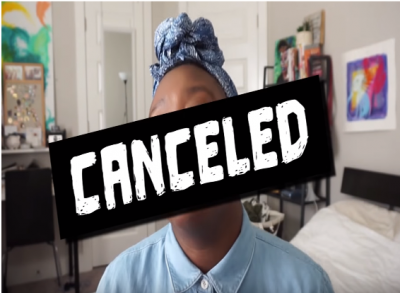
Written By
Lindsay J. Dorder
Twitter: @LindsayDorder
This last year has been a whirlwind of change for me. Particularly, I have learned about the importance of using social media platforms as a health scientist. Whether you use social media for advocacy, dispelling myths, or even posting some great selfies, developing an online presence can open a world of support from others around the globe. However, because everyone is entitled to an opinion, it can also result in messy debates depending on what you decide to share—or even better, what you decide to #cancel.

I have come to understand that in popular social media, to call-out someone else, or even yourself, means to openly expose past or current actions that society would condemn. This call-out could result in being cancelled, which means that others are supporting a complete boycott of your platform, services, or products.

YouTube influencer “Evelyn from the Internets” created an updated response to a video she posted about her fear of being dragged and called-out on social media.1In this update, she emphasizes how our favourite influencers are simply human. They make mistakes and have most likely posted content in the past that someone will find problematic.1She reflects on her past online mistakes, such as old forgotten tweets, and encourages the viewer to understand that people can learn to do better. She states, “I think what makes me the most nervous about call-out culture is [that] it creates this immense amount of pressure to be perfect.”
As a graduate student who is required to consistently evolve, whether professionally or with my research, I share Evelyn’s fear of potentially being “cancelled” on social media. Who knows what content 13 year-old Lindsay put out on the internet! With the growing awareness of Impostor Syndrome in academia2, there is added stress and frustration when developing a qualified social media presence as a science communicator. Impostor Syndrome creates feelings of unworthiness and makes one negatively question their expertise.2You may feel like a fake despite having the ability and skills required of you. These doubts can lead to significant issues with your mental health, such as causing depression or reducing your self-esteem.
So how can we do to fight off this worry to freely share what we believe in? For me, it was almost like ripping off a bandage. For example, I remember posting my first tweet and then avoiding Twitter out of anxiety of what others would think. I had to actively push myself to embrace my online identity as a health scientist amidst a pop culture that relishes petty rage.

I have not found a bullet-proof method of developing a social media presence. It continues to feel like uncomfortably diving into the deep end of the internet. Ultimately, everything we share has the potential to insult someone, and some people simply love the drama. We can either confront the debates that stem from our posts or ignore them. These options can be passive or active actions. To me, passive means to give a closed-ended response; for example, with a meme or a sarcastic reply. There is no intent to explain your post or filter the comments. Active means you are ready to present counter-arguments, or to actively prevent replies by blocking any individual who disagrees with you. At the end of the day, cancel/call-out culture will always persist throughout social media—because that’s what it is, a culture. A social collective. If someone says you’re doing something wrong or playing into respectability politics, reflect on it (even if it hurts, and trust me, it will).
For instance, Kimberly N. Foster, another well-established YouTuber, echoes similar ideas on call-out culture in a recent video addressing the toxic hierarchies that some feminists create, especially towards female celebrities.3Kimberly discusses call-outs using the term “drag”—think of it as a synonym. She states, “It’s not even worth it to go back and forth with people who are just determined to drag, you know? […] There’s nothing I can say to you to talk you out of it, because dragging is not even really about the subject of the drag, it’s about personal catharsis”.3Kimberly urges that in a world that loves a good call-out moment, reconciliation and rehabilitation are vital components that will move us forward as a community.3Isolating someone because of problematic statements without offering them a chance of growth and self-realisation will only further encourage our elitist society. We can show empathy while also explaining why someone’s opinion is problematic.3These are not mutually exclusive ideas.
Think twice about that rage that bubbles inside of you when tweeting, commenting, or replying to an opinion that you disagree with. Is it worth it? Will that person learn something, or are you the one in the wrong? As I develop my personal style of science communication in the vastness of social media, I agree with Evelyn and Kimberly to promote empathy and mindful actions. This is not an easy task, and we all think we are good people. Let us critically identify what values and habits unintentionally marginalize, or belittle, others.
In closing, overcoming social media fears is not about achieving or (falsely) portraying perfectionism. The best we can do is to feel confident and happy about what we do. Find your voice. Find that fire to share what you want, then decide how you will tackle a potential call-out. Some people are better left ignored, and others may truly benefit from redemption. Overall, empathy is a skill that requires lifelong learning.
References
- Evelyn from the Internets. I am Your Problematic Fav [Internet]. YouTube; 2018 Jun 20 [cited 2019 May 16]. Video: 10:14 min. Available from: https://www.youtube.com/watch?v=1KWHfNxntlQ
- Riegle-Crumb C, King B, Moore C. Do They Stay or Do They Go? The Switching Decisions of Individuals Who Enter Gender Atypical College Majors. Sex Roles. 2016;74(9–10):436–49.
- For Harriet. I’m Done with Mean Girl Feminism [Internet]. YouTube; 2019 May 9 [cited 2019 May 16]. Video: 20:38 min. Available from: https://www.youtube.com/watch?v=byybf63-eTI